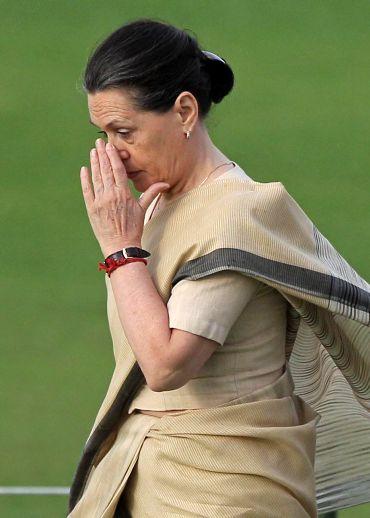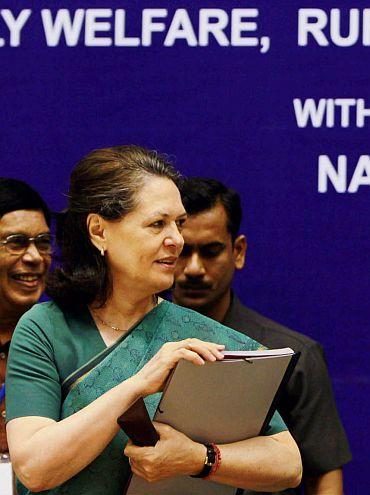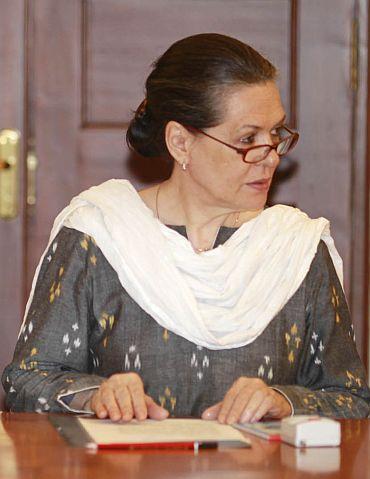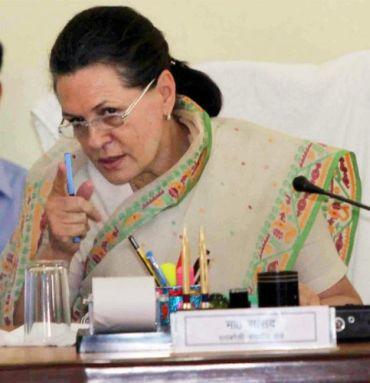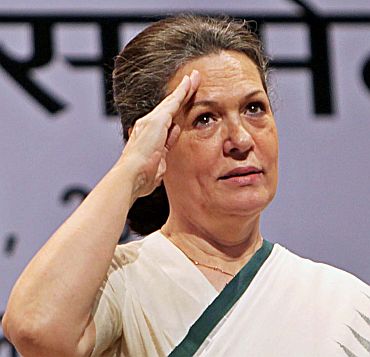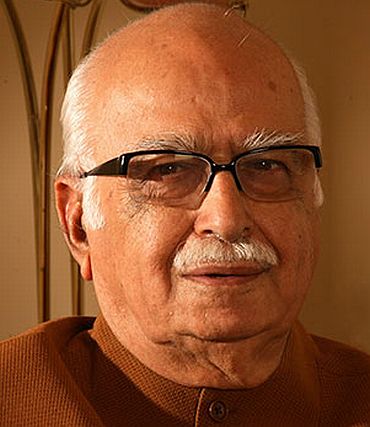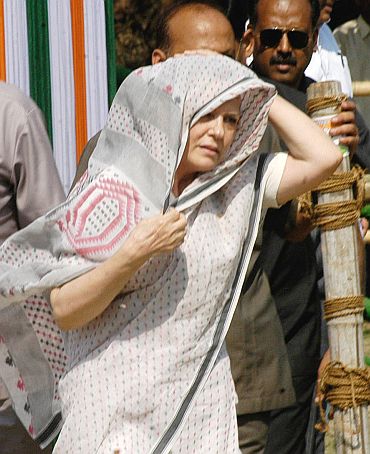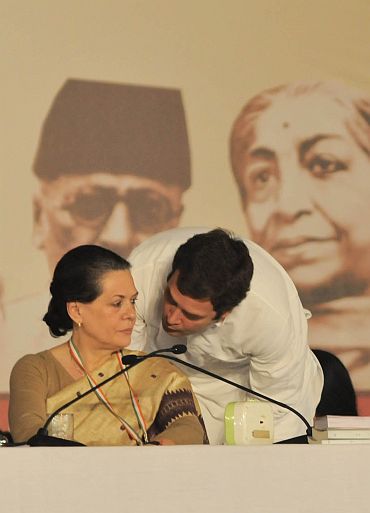 | « Back to article | Print this article |
Congress revival: Challenges before Sonia Gandhi
Given the challenges that confront the Congress today, Sonia Gandhi will have to fashion a new base for the party around a new political axis, and new themes, which catch the attention of its potential constituents, writes Neerja Chowdhury
The victory of the ruling Congress party in 2004 and again in 2009 was in no small measure attributed to the support that urban India gave it.
But now, it is this urban middle class that is becoming disenchanted with the ruling Congress over the successive scams that have come to light in the last one year.
They have also dented the image of Prime Minister Manmohan Singh, once the darling of this middle class, for his inability to control corruption and handle the crisis that gripped his government. Nothing that the government did to stem the damage seemed to work.
The government -- and the ruling Congress party -- looked like a rudderless and leaderless ship, while Congress president and United Progressive Alliance chairperson Sonia Gandhi was abroad for medical treatment.
Click on NEXT to read further...
Congress revival: Challenges before Sonia Gandhi
Her surgery abroad for an undisclosed illness coincided with the agitation launched by Anna Hazare against corruption and also saw senior ministers in government warring openly.
She had her tasks cut out when she returned home after five weeks of absence. It was a period when rumours had been rife about her illness, creating an element of insecurity and uncertainty in the Congress about the future shape of things to come.
Her first task was therefore to scotch these rumours and send a message to her partymen and women -- and to the country -- that she was back in business.
She has done this by carefully calibrating her public appearances.
Click on NEXT to read further...
Congress revival: Challenges before Sonia Gandhi
Soon after her return, she chaired a party meeting to decide tickets for the forthcoming critical state elections in Uttar Pradesh.
She intervened personally in the spat between senior Ministers Pranab Mukherji and P Chidambaram to effect a "patchup".
She made a courtesy call on President Pratibha Patil. She also called on the Lok Sabha Speaker Meira Kumar and visited Raj Ghat on Gandhi Jayanti, and took part in the Dussehra celebrations in the capital, when the cameras caught her looking like her old self.
All these appearances were meant to convey the same message -- that she is firmly in the saddle again, even as she will take time to fully recover.
Click on NEXT to read further...
Congress revival: Challenges before Sonia Gandhi
To convey this impression was of the utmost import, given that the government has lost a lot of ground with serious misgivings about its ability to complete a full five year term, and squabbles resurfacing in the party at various levels.
Gandhi's distinctive contribution in the last 13 years since she came into active politics has been to act as the umbrella, keeping the party together. She has also been the synthesiser of different strands.
To effect a turnaround in the prevalent mood in the party and the country, the Congress will have to win a sizeable number of state elections, which are due next year, given the beating the party image has taken in recent months, and the demoralisation in its ranks.
Click on NEXT to read futher...
Congress revival: Challenges before Sonia Gandhi
Gandhi's immediate challenge therefore is to galvanise the party -- and forge alliances, if necessary -- so that it can win the forthcoming elections in Punjab, Uttarakhand, Goa and form a coalition government in UP with Mulayam Singh Yadav (which can happen only if the Congress can emerge as the kingmaker).
Given the challenges that confront the Congress today, Gandhi will have to fashion a new base for the party around a new political axis, and new themes, which catch the attention of its potential constituents -- like a reduction in food prices, which has caused the party more damage than anything else, a fair compensation for land, when acquired, to farmers, adequate and guaranteed food security.
In other words, to go back to being the party of the aam admi in more than just rhetoric.
Click on NEXT to read further...
Congress revival: Challenges before Sonia Gandhi
Indian politics today is getting polarised on lines reminiscent of 1989-90, between what can be described as the 'pre-Mandal politics of VP Singh' pitted against his 'post-Mandal politics'.
The BJP is clearly trying to go for the pre-Mandal politics, which had witnessed the anti-corruption fervour (symbolised by kickbacks in the Bofors gun deal), and captured the imagination of the urban, middle class India and essentially the upper castes, rather like today, when urban, middle class India is agitated about against corruption, and epitomised by the Anna agitation.
Small wonder then that LK Advani is about to undertake his janchetna yatra against corruption in 27 states and 100 districts of the country, and Kalraj Mishra and Rajnath Singh will criss-cross through Uttar Pradesh on their mini yatras taking up the same theme.
Click on NEXT to read further...
Congress revival: Challenges before Sonia Gandhi
Anna Hazare has also come out much more openly against the Congress. Without waiting to see if the government brings the Lokpal Bill that it promised in the winter session of Parliament, he has already come out against the Congress candidate in the Hisar by-election in Haryana, and also declared that he would oppose the Congress candidates in UP.
As things stand, no matter which weighty politician or corporate honcho has gone to jail on corruption charges, the Congress is unable to turn around the situation or win back the support of these opinion-making group, which had backed it in 2004 and 2009.
Given these hard realities, the Congress may have little option but to fashion "post-Mandal politics" if it is to have a survival chance.
The second phase of VP Singh's politics had revolved around the rise of OBCs, dalits and Muslims, and it had changed north Indian politics. The question arises: Can a beleagured Congress create this constituency for itself?
Click on NEXT to read further....
Congress revival: Challenges before Sonia Gandhi
The Muslims can gravitate to the Congress in a national election and one of the reasons why the RSS may be getting a rethink on the candidature of Narendra Modi as BJP's PM candidate is to prevent this from happening.
Unlike in the past, the Dalits are not with the Congress. Rahul Gandhi has made sporadic attempts to woo Dalits by visiting their huts and staying in their hamlets, but the Jatavs in UP remain firmly behind Mayawati. So far the Congress has not come out with a strategy to win over, if not the Jatavs, then at least the non-Jatav Schedule Castes, including the Valmiks in UP.
As for the OBCs, traditionally, they have not constituted the Congress' vote base. One way to woo them would be for the Congress to forge an alliance with the OBC parties, and as a matter of interest these groups did not react favourably to the Anna agitation because they suspected it as an implicit attempt to restore the rule of the upper castes.
It will, however, not be so easy for the Congress to reach out to Mulayam Singh's Samajwadi Party, or Deve Gowda's Janata Dal-Secular or even Ajit Singh's Rashtriya Lok Dal, or the smaller groups and rumps, not only because they will demand their pound of flesh but also because the Congress will have to give up its go-it-alone policy, advocated by Rahul Gandhi, for revival.
Click on NEXT to read further...
Congress revival: Challenges before Sonia Gandhi
The second question that confronts Sonia Gandhi today is this: Is it possible to go in for new themes under the old leadership of Dr Manmohan Singh? There are many in the Congress today who have started to clamour for a "larger role" for Rahul Gandhi.
Behind the scenes he is reported to be already assisting his mother and may even be designated as working president of the Congress party before yearend. But would that connote a "new start" that is necessary? And, more important, if he does takeover, would he have what it takes to turn around a highly difficult situation? So far, Rahul Gandhi has shown no inclination for taking over power.
It is not as if all the damage was done only in the five weeks that Gandhi was abroad, a period that coincided with the Anna agitation. Even before she left for her treatment, the Congress was unable to get on top of a difficult situation with successive scams taking their toll. But what is going for Gandhi is that she still wields a moral authority in the party, and this was evident when she could get warring senior leaders to call a 'truce'.
Click on MORE to read another feature...
